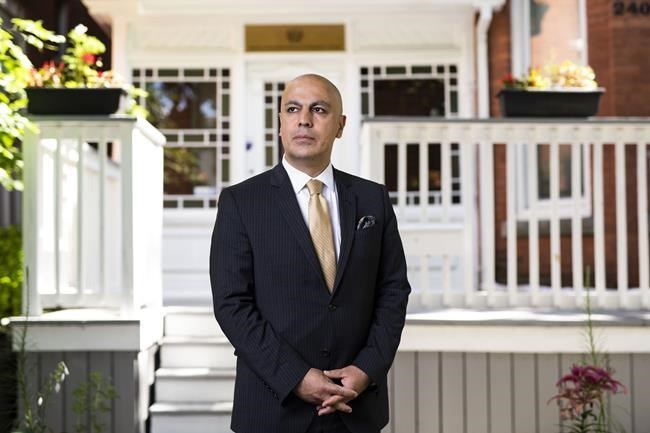OTTAWA — Afghanistan's ambassador is urging action to ensure that Afghans who have been approved to come to Canada do not have to risk detention by the Taliban when they apply for a passport.
Hassan Soroosh, ambassador to Canada, said in an interview that Afghans are facing house to house searches, extrajudicial killings and forced disappearances under the Taliban.
He said Afghans who helped Canada and its international partners before the Taliban regained control are in a state of "high vulnerability."
"In Afghanistan, there is the risk of detention and prosecution for those who want to get a passport under the Taliban," he said. "Those who worked for the Canadian government and international partners — the risk is always there."
The ambassador called for a relaxing of rules on documents for approved Afghan refugees and immigrants trying to reach Canada.
"We wish and we hope there will be a more flexible approach when it comes to documentation inside Afghanistan and also the paperwork that is required in terms of bringing people to Canada," he said.
He also called on Canada to widen the eligibility criteria for coming to the country under a humanitarian program set up to help vulnerable Afghans facing Taliban persecution.
Canadian charities helping Afghans say many with permission to travel to Canada are unable to get to neighbouring countries to fly here because they do not have the paperwork or a passport to cross the border.
Others have been waiting so long in countries like Pakistan and Uzbekistan for their applications to be processed by Ottawa their visas have expired and they are being sent back to Afghanistan where they face Taliban reprisals.
Aidan Strickland, spokeswoman for Immigration Minister Sean Fraser, said the department was letting Afghans who have been unable to leave know that it "can help facilitate travel to Pakistan."
She said Canada had been issuing single-journey travel documents for Afghans who had made it out of the country but did not have a passport to board a plane.
"We are doing everything we can to help Afghans inside and outside of Afghanistan, including working with partners in the region, state entities, international organizations and non-profit organizations to identify a path forward to secure safe passage for all," she said.
Soroosh urged Canadians not to forget Afghanistan, as the world community focuses on the crisis in Ukraine.
The ambassador said Afghanistan is facing "a dire and tragic humanitarian crisis," with starvation facing a huge proportion of its children, he said.
He said a recent earthquake, which killed around 800 people and injured many more, had damaged buildings, schools and the water network, causing "unimaginable suffering."
Poverty rates are projected to rise to 97 per cent by the end of the year, when two-thirds of the population — according to the United Nations — will need life-saving food aid, he said.
Soroosh said the Taliban's increasingly hard-line stance toward women was making the situation worse because many were no longer allowed to work.
"Women are being gradually but systematically erased from public life," he warned. "They are denied access to education, they are not able to work, they cannot protest — it means they gradually become invisible."
He added: "Afghanistan is the only country in the world where girls are denied a secondary education."
Soroosh, whose embassy has no contact with the Taliban, is still offering consular services to Afghans living in North America, including passport renewal and issuing birth certificates.
He said the Ottawa embassy was also serving Afghans living in the U.S. after Afghan embassies closed there.
The embassy is being funded from fees for passport renewals and other consular services and on a much reduced budget and staff.
Soroosh said he was grateful to Canada for opening its doors to Afghans fleeing the Taliban and providing humanitarian assistance.
"Canada has always been one of the first countries to respond," he said
Though he said it was important not to legitimize or recognize the Taliban, he supported moves to make it easier for charities to operate in Afghanistan to provide aid.
Currently any dealings with the Taliban are outlawed under Canada's anti-terror laws, because the Taliban is a prescribed terrorist organization.
Non-governmental organizations have asked for Canada to bring in exemptions to the Criminal Code for humanitarian programs operating in Afghanistan, as in the United States.
"I am very much hopeful that the outcome will help with a kind of solution that will help with the humanitarian aid to Afghanistan, without helping the Taliban consolidate their power, without legitimizing the Taliban," the ambassador said.
Soroosh said the Taliban were becoming increasingly hard-line and were not a moderate or more inclusive version of the previous regime.
He said they are "the same old Taliban — they have not changed."
This report by The Canadian Press was first published July 8, 2022.
Marie Woolf, The Canadian Press



